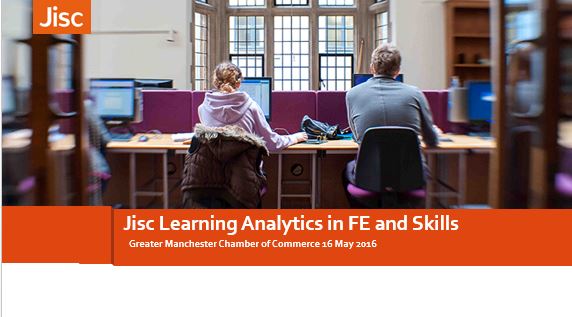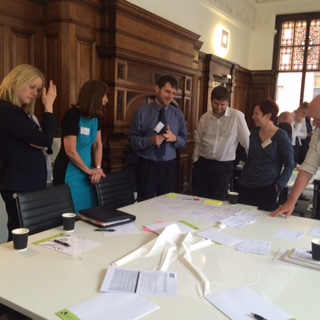A workshop in partnership with the Greater Manchester Chamber of Commerce was held on Monday 16 May and attended by 25 people including representatives from colleges and Jisc customers’ service. The workshop was introduced by Louise Timperley, Director of Skills and Employment, Greater Manchester Chamber of Commerce & Martin Hall, previous Chair of Jisc now working with us to engage the sector in the learning analytics project.
The workshop was facilitated by by Paul Bailey and Shri Footring from the Learning Analytics Project. The workshop leaders provided an overview of current analytics activities and plans, as well as some context for the needs regionally and nationally. An overview provided information on the Learning Analytics architecture and the FE Analytics Labs
The purpose of the workshop was to explore significant opportunities for improving access to data, and analytical capacity, in the face of the significant changes that are taking place across further education and training, skills commissioning and apprenticeship provision and funding.
The workshop built on some FE Analytics User Stories that had already been created through earlier consultation processes with colleges. Around 35 user stories were used to initiate the discussion which were group in the following categories.
A – Improve individual student performance – user stories from (e.g. staff, employers, parents, learners) that generate interventions aimed directly at learners but also look at different user types e.g. apprentices, teachers
B – Improve teaching and learning quality – users stories that generate interventions aimed at teaching staff to improve quality across groups of students
C – Improve college support systems and process – user stories that generate interventions aimed at support staff and the process around support staff and students.
D – Develop college strategy – user stories that inform the strategic priorities and interventions required to improve the performance of the college
Activity 1 and 2 – User stories and data sources
The participants used the initial user stories and added, edited or created new ones. These were then prioritised and some of the data sources that might be useful to address the analytics questions in each user story were identified.
Participants extended the breadth and depth of user stories that would be useful to colleges. The user stories that were prioritised were around using analytics to
- help learners to improve retention, achievement of grades and make informed decisions regarding their next destinations
- improve the quality of learning and teaching, including looking at the curriculum design and use of rich content in online learning
- improve college support processes to improve retention and provide effective careers service to support progression
- understand the employer demand to better plan curriculum and recruitment
- track finance and quality to remain competitive.
Several institutional data sources were identified as well as external sources data such as the Outcomes Based Success Measures data set which can be found at https://www.gov.uk/government/publications/adult-further-education-outcome-based-success-measures-experimental-data-2010-to-2013
Activity 3: Opportunities and Challenges
The next activity considered what might be involved in the implementation of some of the user stories. Many of the issues raised in these discussion aligned well with activities being under taken on the Jisc learning analytics and business intelligence projects. Specifically
- the Code of Practice on legal and ethical issues of learning analytics and a Data Processing Agreement between Jisc, Colleges and suppliers will address concerns expressed around ethics, data security, sharing etc.
- the unified data definition and data formats being defined by Jisc address need a for agreed and shared definitions, identifiers, common frameworks
- the Jisc analytics labs will provide access to national data sets to explore new data analytics
- a pilot project from Sept 2016 Analytics Academy will provide training to staff to make better use of data and analytics and the learning analytics project will be supporting colleges to engage and train staff
- the learning analytics service will tools that give alerts and interactive dashboards for attendance, retention and attainment (progression)
Conclusions and workshop outputs
The outputs from these discussions can be found in the Learning Analytics Manchester workshop outputs report.
The next stage is to plan a project from September that will implement an FE Analytics Lab to develop some prototype visualisations for several of the user stories prioritised by these workshops. As part of this planning Jisc will be looking to engage the clusters of colleges in Manchester to build a learning records warehouse of anonymised college data that can be used as part of the project. The project will then identify and locate a range of data sets, nationally and locally that can be used as part of the Analytics Labs project.


